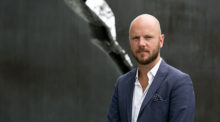Mark Kersten is a Fellow at the Munk School of Global Affairs. A sessional lecturer for the Munk School’s Peace, Conflict and Justice program and international criminal justice consultant, Kersten is also the director of research for the Wayamo Foundation. We spoke to him about his efforts to bring justice and accountability to victims of war violence.
What’s a global issue that you’re passionate about and why?
By far the issue I find most compelling is that of justice and accountability for massive human rights violations and war crimes. Global justice means a lot of things to different people, but I’m interested in exploring the relationship between the crucial goal of achieving justice while resolving conflicts through peaceful and diplomatic means. In the last fifteen years, we’ve seen the pursuit of accountability for international crimes like genocide, ethnic cleansing, war crimes, and crimes against humanity, while conflicts are still ongoing. We don’t wait for wars to be over, and this obviously creates dilemmas – when the very individuals who are potentially perpetrating these crimes are also the interlocutors you need to talk to in order to resolve conflicts. Thinking and working through these dilemmas to identify ways to maximize our ability to achieve justice without undermining peace is important to me and is the stuff that keeps me up at night and keeps me writing!
What’s your favourite travel memory?
I recognize that it’s a bit cliché, but the first time I travelled to sub-Saharan Africa. I lived in Uganda for three months to do research on the effects of the International Criminal Court on the peace process between the Government of Uganda and the Lord’s Resistance Army. Personally and professionally it was a leap of faith for me – to move somewhere I’d never been to, not knowing what to expect, and in fact discovering that the things I expected weren’t true about the place. But I really cherished my experiences. It became a seminal trip that informed my doctoral degree, and later my first book, Justice in Conflict: The International Criminal Court’s Impact on Conflict, Peace, and Justice. It taught me how to do research on the ground. It also informed my decision to give the royalties from my book to send copies to universities and libraries across the continent. And I loved being an investigative researcher, jumping on ‘boda-boda’ motorcycles to meet people who were willing to speak with me — and just listening to their stories. Both personally and professionally, that first trip was hard to match.
What impact do you want to make on the world or your local community?
Very early in my career, I started a blog called Justice in Conflict. My goal was to make international criminal justice more accessible to people. Virtually everybody is concerned with global justice in some form today, yet the field uses very technical and complex language to describe what it’s trying to do. Institutions don’t always do a very good job of telling their own story, and the blog was meant to make it more understandable, with the hope that we could get more people interested and involved in discussions that affect so many folks around the world. We’re trying to achieve a similar goal at the Wayamo Foundation, by working closely with people in Kenya, Uganda, Rwanda, Tanzania and elsewhere in order to increase and support these states’ ability to prosecute war crimes and crimes against humanity themselves — domestically. As important as institutions like the International Criminal Court are, it’s also essential to bolster the capacity and political willingness of those states, because justice and accountability are best served where they can take place and as close to the victims and survivors as possible.
What does the future hold for you?
I have generally had a nonlinear trajectory, and I’m happy about it. I did biological chemistry as an undergrad, then ended up in history, then I worked in Canadian politics for a year and a half before going to the London School of Economics where I studied Conflict and Peace Studies and the politics of international law. Even if I never had a clear career path, there’s some internal logic to these choices — at least in my mind! There are different possibilities in the future, but I hope I’m still working on these issues for a long time. I feel very fortunate to be working on them now. They get under my skin in a way that drives my research and my work.
If you had any advice to give to your younger self, what would it be?
Relax. Breathe. My life motto has always been to take my work seriously without taking myself too seriously. That’s hard sometimes, especially as a young student or researcher getting into the field. It’s something you learn yourself as you go through life – my younger self probably wouldn’t listen to me anyway. But I think it’s important to keep in mind that you can easily get lost by trying to do everything rather than setting appropriate expectations for yourself and your work. Keeping expectations realistic, remembering to let go and to have fun from time to time, even being silly — it helps keep things in perspective.
Behind the scenes
Mark Kersten’s portrait was taken in front of the Katyn Monument in Toronto’s Parkdale neighbourhood, a work by artist Tadeusz Janowski to commemorate the mass execution of Polish citizens carried out by the Soviet forces in April and May 1940. “This monument resonates at a deeply personal level because my great-grandfather was killed during the massacre, and his daughter, my grandmother, Krystyna Kersten, was a leading Polish historian who pushed for more justice and accountability with respect to this tragedy. It evokes the challenges and dilemmas related to the denial of justice and the politicization of memory, and it is a reminder of my own heritage, and of my own journey in the footsteps of my forebears.”
October 2, 2017
